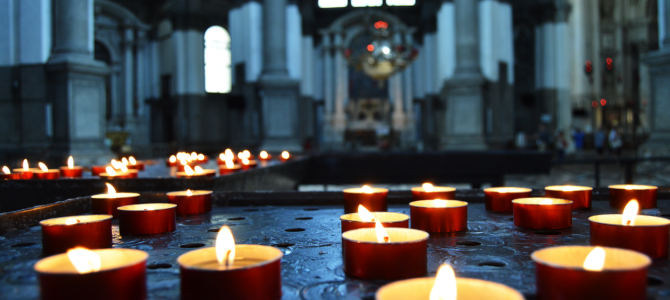
Musings inspired by E.E. Cummings’s poem ‘The Glory Is Fallen Out Of’ and Samuel Barber’s work for a-cappella choir, Twelfth Night. In honor of David Bentley Hart.
“the glory is fallen out of / the sky the last immortal / leaf / is // dead and the gold / year / a formal spasm / in the // dust / this is ‘the passing of all shining things‘ … into the night so dark no night could be darker than, the cold so cold, no cold could be colder than; the journey through ‘The mile still left when all have reached / Their tether’s end: that mile / Where the Child lies hid.’”
The light shines in the darkness, and the darkness does not overmaster it. But neither has light overmastered the darkness: lights do not shine in darkness unless darkness predominates. When there’s mostly light, we see the darkness as residual shadows, not as the ambient state.
The Gift of Light Amid Darkness
Darkness is in one sense the enemy of God, of Christ who is light, whose dawn at Easter irreparably shatters the dark of death and hell, the light of the eighth, eternal day, shining for all days before and after: “Can there be any day but this, / Though many sunnes to shine endeavour? / We count three hundred, but we misse: / There is but one, and that one ever.”
But darkness is also God’s gift. Darkness is how we come to know that light, not darkness, has positive substance, a substance not to be taken for granted. Dark nights of the soul are from God, not the enemy.
Easter is eternal, the center of the liturgical year. But the liturgical year begins with Advent, the season farthest from it, the season that waits in ever-increasing darkness, waits for a light that’s not yet even born.
Advent is a season of hope, yes, but also one of penitence, another Lent, not ending in the drama of Holy Week and the decisive triumph of Easter, but ending merely in an incipient promise, new born and shivering in the dark: an infant born into an age when surviving childhood was by no means assured, “An infant crying in the night: / … and with no language but a cry.”
Those of us now heir to the story of this child live with the luxury of already knowing how the story ends. We know that, in the light of Easter, this tiny hairless mammal, crying inarticulately as all newborns must, will reveal himself as the Word made flesh, the Word who is, indeed, the Final Word—the one who will return “with clouds descending” at the Second Coming, bearing the “dear tokens of his passion” on a “dazzling body,” heralding a new heaven and a new earth where the chaos of the sea is banished and all tears will be wiped away. In light of all that, our jollying and hollying doesn’t have to wonder at the absurd fragility of one light nascent amid so much darkness.
No Lingering, No Backward Wondering
Nor do we have to wonder whether the Annunciation portrayed a God of Israel no different from the other lecher gods of antiquity, rogering human females as it pleased them, providing convenient (if not exactly plausible) cover for bastardy and infidelity.
Nor need we worry, as those tenderly devoted to Jesus did, even as Easter itself was dawning, why “they” had taken Jesus out of the tomb, and what “they” had done with his body. Right up until the moment they witnessed the resurrection, even Jesus’s most faithful followers couldn’t know what we take for granted now: how the story of this child would end in victory.
Faithful Christians can’t un-know how the story ends, but the liturgical year is space to imagine the story unfolding in time once more, to marvel at its absurd contingency, how “the path that leads through nature and history to his Kingdom does not simply follow the contours of either nature or history, or obey the logic immanent to them, but is opened to us by way of the natural and historical absurdity – or outrage – of the empty tomb.”
no lingering no backward-
wondering be unto
us O
soul
No lingering, no backward wondering. The glory of autumn is over, all wrecked, all spent in pursuit of the darker solstice, the point at which light almost dies. At the end of Holy Week, we will extinguish the candles one by one, despite the growing light of springtide. But now, as the darkness of winter grows, we light the Advent candles, adding one mere point of light a week, points not overmastered by darkness, but not conquering it, either.
lead us
into the
serious
steep
darkness
Perhaps that’s what hope is: not a sunny disposition, but plunging headlong into the dark, knowing that it is dark, as if all the glory of autumn were no defiance of the darkness to come, but a positive passion burning for it. It burns for winter’s barrenness, burning all the brighter not to resist its own extinction, but to anticipate it, to anticipate the darkness that makes newborn light visible. Perhaps the growing darkness of the year at Advent is there to remind us of a faith that set us free from optimism long ago, and taught us hope instead.
A first draft of this post first appeared as part of the group writing series at Ricochet.com.









